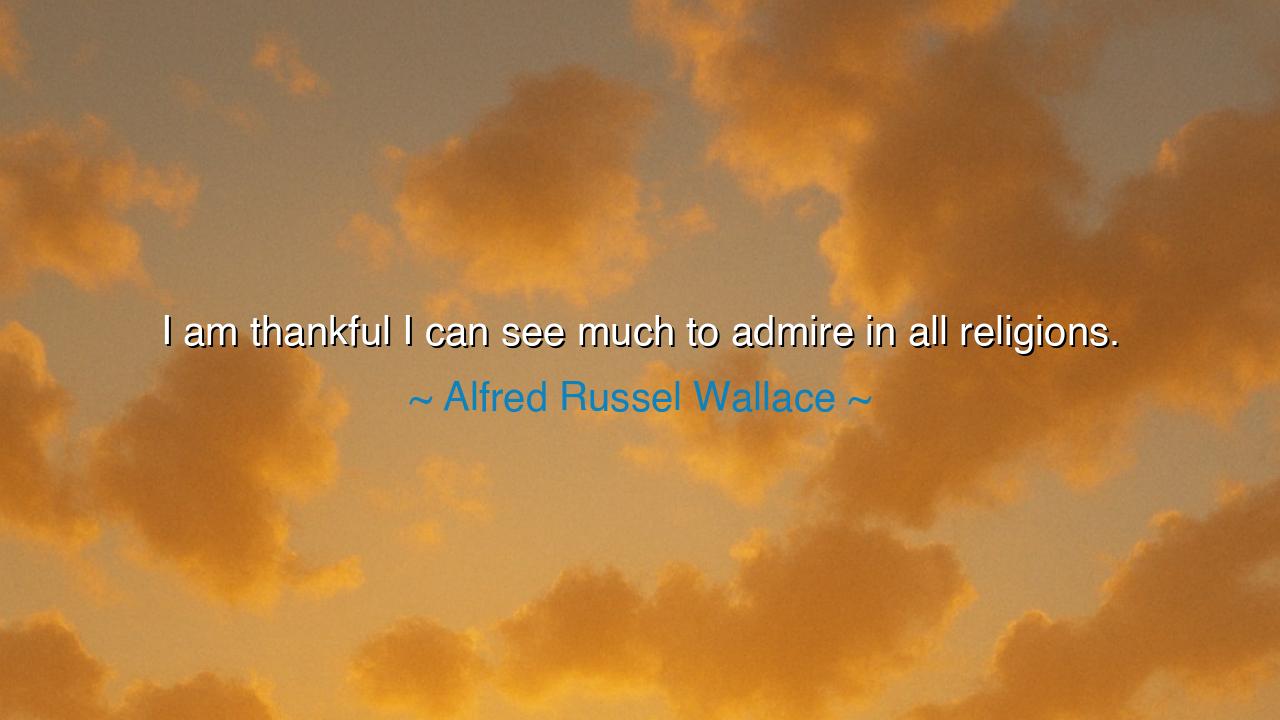
I am thankful I can see much to admire in all religions.






“I am thankful I can see much to admire in all religions.” Thus spoke Alfred Russel Wallace, the naturalist and explorer, the humble seeker of truth who gazed into both the jungles of the earth and the mysteries of the human spirit. In this gentle yet profound statement lies a vision of unity that transcends creed and division. Wallace, who co-discovered the theory of evolution alongside Darwin, was not content to study only the material world—he sought also to understand the spiritual thread that runs through all living things. In these words, he does not praise one faith above another; he gives thanks for the light of goodness that shines, in different hues, through them all.
To say that one sees “much to admire in all religions” is to stand upon the mountain of wisdom, from which the valleys of belief appear not as rivals, but as rivers flowing from the same eternal spring. Each faith, in its own language, seeks to answer the same questions: What is the nature of the soul? What is the purpose of life? What does love require of us? Though the answers differ in form, their essence is one—compassion, humility, and reverence for the mystery of existence. Wallace’s gratitude, therefore, is not merely intellectual—it is spiritual. He rejoices in the shared striving of humankind toward the divine, the recognition that no single path holds the whole truth, but all are touched by the divine breath that animates creation.
The origin of this quote rests in Wallace’s lifelong journey through both science and spirit. Unlike many of his contemporaries, who saw religion and science as enemies, Wallace saw them as two instruments playing in harmony—reason and faith, each revealing part of a grander symphony. His travels through the Amazon and the Malay Archipelago exposed him to countless cultures and beliefs—Christianity, Islam, Buddhism, Animism—and he came to see that beneath the rituals and doctrines lay the same yearning for transcendence. In this way, Wallace became not only a man of science, but a philosopher of the human soul. His words remind us that the mark of true wisdom is not the defense of one’s own view, but the ability to see beauty in all.
Consider the life of Mahatma Gandhi, who lived many decades after Wallace but embodied this same spirit of reverence. Though born a Hindu, Gandhi drew wisdom from every sacred text—the Sermon on the Mount, the Quran, the teachings of the Buddha. He once said, “The truth is one, the wise call it by many names.” His strength came not from rejecting other faiths, but from embracing their goodness. When asked which religion he belonged to, he replied, “I am a Hindu, a Christian, a Muslim, a Jew, and so are you.” This is the heart of Wallace’s gratitude—the vision of a world where faiths are not walls but bridges, where reverence for truth is greater than allegiance to doctrine.
To admire all religions is not to deny their differences; it is to perceive their shared light while understanding their shadows. Every tradition carries both wisdom and weakness, both revelation and limitation. But to dwell only on the flaws is to remain blind to the divine beauty within them. Wallace’s thanksgiving teaches us to look with eyes of empathy, to seek not conflict but connection. In a world divided by fear and arrogance, such gratitude is revolutionary. It calls for humility—to recognize that our understanding is partial, and that others may hold a piece of the truth we lack.
The lesson, then, is this: cultivate the heart of appreciation. Let not your faith, or your philosophy, or your learning make you proud; let it make you compassionate. Study the sacred writings not only of your own people, but of others. You will find in each the echo of the same divine call—to live with justice, to love one another, to honor life. The wise do not measure faith by its name, but by the goodness it bears. To see beauty in all religions is to walk in the spirit of peace—to rise above the noise of argument and dwell in the music of unity.
So, my child of the seeking heart, remember these words of Alfred Russel Wallace: “I am thankful I can see much to admire in all religions.” Let your gratitude be your guide. When you meet another whose prayer is different from yours, listen with reverence; when you read of customs strange to your own, look for the love that lives beneath them. Be a student not of division, but of truth, which belongs to no one and to everyone. For when you learn to see the sacred in all faiths, you will find the divine in every face—and your heart, like Wallace’s, will be filled not with judgment, but with awe.






AAdministratorAdministrator
Welcome, honored guests. Please leave a comment, we will respond soon